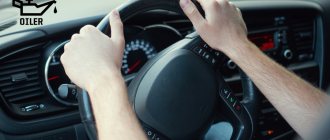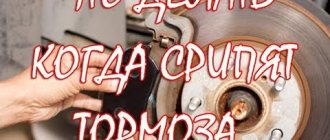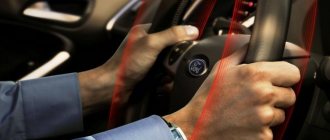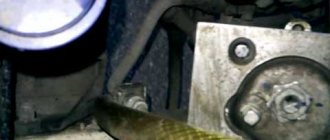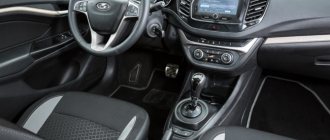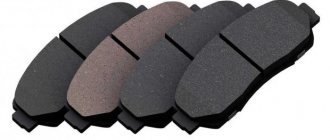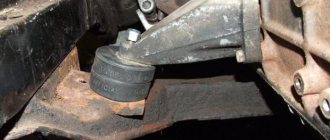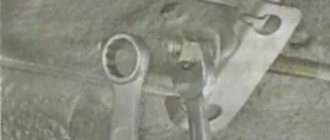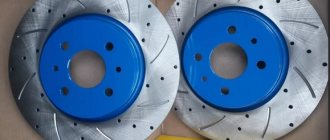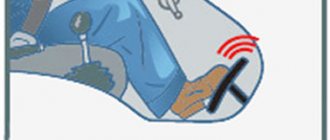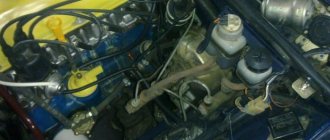Sometimes a grinding noise is heard on the front wheels when braking. There may be several reasons for this. Moreover, some of them can lead to very serious problems. In this regard, it is advisable to carry out correct diagnostics and eliminate the malfunction at the first signs of grinding.
Remember that problems with the brakes, suspension and steering can threaten the safety of driving your car. Checking and fixing problems usually does not take much time.
Even a novice driver can do this job. Before troubleshooting, make sure the remaining components are working properly. Sometimes a grinding noise can occur when a small pebble gets under the block. This problem goes away quickly, but it would be a good idea to check the state of the system.
Crunch when braking VAZ 2110
Sometimes a grinding noise is heard on the front wheels when braking.
There may be several reasons for this. Moreover, some of them can lead to very serious problems. In this regard, it is advisable to carry out correct diagnostics and eliminate the malfunction at the first signs of grinding. Remember that problems with the brakes, suspension and steering can threaten the safety of driving your car. Checking and fixing problems usually does not take much time.
Even a novice driver can do this job. Before troubleshooting, make sure the remaining components are working properly. Sometimes a grinding noise can occur when a small pebble gets under the block. This problem goes away quickly, but it would be a good idea to check the state of the system.
When braking, there is a crunching sound from the front of the car: diagnostics and elimination of the defect
The most likely cause of a crunching noise during deceleration is the poor condition of the caliper guides. When a symptom appears, you must first check their condition for the absence of play, corrosion areas and the presence of heat-resistant lubricant. Indirectly, pads that have become smaller as a result of wear can produce an unpleasant sound.
Also, when braking, the following elements of the suspension and steering can produce a crunching noise from the front:
- steering tips (at the initial stage of intense wear);
- worn CV joint;
- spherical bearing;
- silent blocks and stabilizer bushings.
In more expensive cars, the deceleration process may be accompanied by a crunching sound due to intensive wear of the suspension position sensors. Ball joints, used in most designs of sensors of this profile, fail quite quickly on domestic roads.
Pads
When braking, a grinding noise is heard from the front wheels. Most often this happens due to worn pads. This consumable consists of a metal base and a friction lining. It is this pad that stops the car by friction against the disc. During operation, the friction material gradually wears off. When it is completely erased, the base begins to rub against the disc. This is what causes the grinding noise.
Sometimes, when the pads are worn too much, the caliper working cylinders can be squeezed out and jam. This leads to increased wear of the brake discs, even to the point of cutting them off. Therefore, you should not delay replacing the pads. Be sure to change consumables on both sides. Also pay attention to other components of the brake mechanism. This is especially important if the pads wear unevenly.
When choosing components, it is advisable to use “original” pads. If you purchase non-original spare parts, make sure that they can be installed correctly. Incorrect installation may cause grinding noise in the future.
Sometimes a pad can break due to various reasons. Most often, the reason is their low quality. The linings crumble very often. The sharp edges resulting from this scratch the disc. Therefore, the disc must be polished when such a problem is identified. Buy spare parts only from reliable places, be sure to ask for certificates. If you had to brake suddenly and then a grinding noise started, the pads may be burnt. Remove carbon deposits from the pads with fine sandpaper.
Calipers
A faulty caliper is often the cause of unpleasant grinding and squealing noises from the front brakes. Most often the problem occurs due to problems with the slave cylinder. If its tightness is violated, it jams. And the pad is pressed against the disc, causing increased wear and subsequently grinding noise. Check the boots and cuffs. At the slightest suspicion of damage, the cylinder must be replaced. If the boot is torn on most models, it can be replaced without any problems. After completing all the work, do not forget to bleed the brakes to remove air from the system.
Another common problem with calipers is pad clamping. This problem may occur due to dirt getting into the unit. Brakes will need to be developed. To do this, using a pry bar, the pads are pressed back to their original position. The assistant squeezes the brakes and the procedure is repeated from the beginning. It is advisable to treat the caliper with a special aerosol designed to care for this structure. If you find it difficult to return the cylinder to its original position, you can slightly release the brake bleeder valve. This will make the task easier. Just don’t forget to add fresh fluid after finishing work and bleed the brakes.
Another problem that arises with calipers is various damage to the guides. Most often it is simple corrosion. Therefore, it is enough to simply treat them with any rust remover. The WD-40 available in any driver’s arsenal will do. But it is best to use a special tool. Sometimes the problem can be caused by bent guide pins. In this case, the grinding noise will appear after driving hard over potholes or speed bumps. If there is a sharp blow to the wheel, the pins bend and can no longer do their job. In this case, the most sensible thing to do would be to replace the damaged parts.
Steering
. With some malfunctions of the steering mechanism, a grinding noise may be observed, especially when braking. Most often, the problem is in the balls. If they are worn out, then when the brake is actively used, a large load is placed on them. In this case, a knocking or grinding noise may be observed. In this regard, be sure to check that the ball joints are in normal condition when a grinding noise occurs.
Conclusion
. Problems with brake pads occur periodically on all cars. This usually becomes noticeable when a grinding noise is heard on the front wheels when braking. In this case, you need to urgently check the car for malfunctions. Some breakdowns can lead to an emergency.
2. A super-duper global manufacturer of units, very popular among chisels, I take the pads (not singed) and install them after the Egoryev ones (not from the factory). About a month later, I felt the urge to quickly walk through one familiar section. Acceleration (free lane) - braking with changing lanes, acceleration (free lane) - braking (changing lanes) and braking to a complete stop on red. The speed did not rise above 80, braking up to 50. Surprise - at the end of the cycle there were no brakes! They overheated (this happened on eight wheels, i.e. the discs are simple). I am 5-10 meters behind the stop line.
To post a reply you must log in or register.
Posts 1 to 20 of 22
1 Topic by Jungle 2014-03-11 11:10:54
- Jungle
- Participant
- Inactive
- From: Unecha
- Registration: 2014-03-11
- Messages: 130 Thanks : 14
- Car: VAZ 2111 1.5i 16v
Topic: Resolved: When braking the engine behind the panel there is a strong crackling sound near the VUT (video)
Hello! This problem has been bothering me for a long time, I can’t find the reason. When braking the engine, a strong cracking sound is heard behind the panel, approximately in the VUT area. You squeeze the clutch or add gas and it stops. The crack is powerful, it’s unlikely that something came loose or came loose from the plastic. Tell me, please, what could it be? Maybe VUT itself?
2 Reply from igorek 2014-03-11 14:58:42
- igorek
- Brother-in-law
- Inactive
- From: Bryansk region g Starodub
- Registration: 2013-05-05
- Messages: 416 Thanks : 191
- Car: VAZ-21102 1.5i-8V Bosch MP7.0H
Re: Resolved: When braking the engine behind the panel there is a strong crackling sound near the VUT (video)
?I?I. I??jungle , look at the condition of the engine mounts.
3 Reply from Jungle 2014-03-11 16:50:04 (2014-03-11 16:57:35 edited by Jungle)
- Jungle
- Participant
- Inactive
- From: Unecha
- Registration: 2014-03-11
- Messages: 130 Thanks : 14
- Car: VAZ 2111 1.5i 16v
Re: Resolved: When braking the engine behind the panel there is a strong crackling sound near the VUT (video)
The crash seems to be coming from inside the cabin.
4 Reply from TOPIC 2014-03-11 17:22:37
- SUBJECT
- New member
- Inactive
- Registration: 2014-03-11
- Messages: 21 Thanks : 9
- Car: VAZ 2111
Re: Resolved: When braking the engine behind the panel there is a strong crackling sound near the VUT (video)
Look at the place where the box cushion is attached to the body. A friend of mine has an 8 valve VAZ 2110, this place is all cracked with cobwebs and the sounds were also not pleasant.
Hello! This problem has been bothering me for a long time, I can’t find the reason. When braking the engine, a strong cracking sound is heard behind the panel, approximately in the VUT area. You squeeze the clutch or add gas and it stops. The crack is powerful, it’s unlikely that something came loose or came loose from the plastic. Tell me, please, what could it be? Maybe VUT itself?
Grinding noise when braking - causes and troubleshooting
Author: Dmitry Sapko
A high-quality car ride assumes the absence of any sounds or unpleasant phenomena. Drivers often do not pay much attention to minor problems, which leads to the need for expensive repairs. If your car has a grinding noise when braking, it is better to fix the problem right away, rather than wait until the problem forces you to go to the service station in a tow truck or tow vehicle with a rigid hitch. Brake grinding can be benign or a sign of trouble, so you should understand its causes and characteristics to ensure that your critical braking system is functioning properly. Remember that it is the basis of your safety and timely reaction to any road situations.
So, your car has a grinding noise when braking. It is necessary to determine its nature. It can be a constant shuffling sound even without pressing the brake pedal, and when pressed, a grinding noise occurs. Perhaps the grinding noise is too sharp and indicates that the pad has begun to eat the metal of the brake disc for certain reasons. However, screeching brakes do not always mean a bad situation. Some pads, mostly non-original ones, have the property of grinding due to inclusions of hard metals or even small stones. In this case, the grinding noise will go away as soon as the layer with the solid additive in the block is erased. Let's take a closer look at what a grinding noise means when braking from the front, rear of the car, at low speed, and other cases.
How to check which CV joint is internal or external if the wheel crunches
This is usually not difficult to check. If the wheel crunches when the steering wheel is turned, but does not crunch when driving straight, then the outer CV joint has come to an end. And if the wheel crunches when driving straight, it means that the inner CV joint is most likely dying.
In my case, there was almost always a crunch, which made me even more upset, since the inner CV joint is a little more difficult to change and costs more than the outer one.
In general, at the service station my fears were confirmed with a statement about the failure of the inner CV joint of the left drive. “Uncle is a specialist,” without even looking, he identified it by the sound.
We didn’t have any money with us for a replacement, so we slowly went home, deciding to deal with this issue the next day.
On the way, we stopped at another service station, where they told me that it was 90% a CV joint and 10% a problem in the gearbox. Well, I think we were even more “delighted”.
Let's move on.
The sound gradually grew into a more ringing metallic crunch. It appeared and then disappeared. Then, within a few minutes, the crunching noise disappeared, but a noticeable vibration began in the pedals, picturing in my imagination a dying main gear, differential and everything else you can imagine.)))
After about 500 meters the vibration passed. As a result, we drove the remaining 10 km in an absolutely serviceable car, without any sounds)))
So I drove into the garage, with the thought of dismantling the drive tomorrow and seeing what happens.
The grinding noise constantly intensifies and is quite sharp.
One of the most common situations in which you will need to use the help of specialists at a service station is an increase in grinding or a sharp, strong sound of metal rubbing against metal. Most likely, the block is completely worn out; you continue to brake with the sole of the block, which is made of hard metal. If this problem is not addressed promptly, the brake disc may fail and require replacement. In this case, repairs will be three times more expensive, so it is better to immediately identify all possible malfunctions and problems that caused the grinding noise when braking. In particular, to diagnose this problem, it is enough to carry out the following processes:
- determine from which side the grinding sound is heard, this will help you halve the amount of work required for diagnosis;
- remove the wheel that you suspect is making unpleasant sounds when braking;
- examine the exposed brake disc for grooves, chips and other problems with the working surface;
- look at the remaining layer of the brake pads, determine the degree of wear and the need for replacement;
- also examine the second wheel on this side, and best of all, examine the braking system on all wheels;
- Identify possible problems that could lead to squeaking and consult with specialists.
This will often help you determine the cause of the squealing noise when braking for free, but disassembling the brake system and performing repair work yourself is not always wise. You can use the services of specialists and guarantee the normal operation of the brake system. However, it is quite possible that all braking systems visually appear to be in good working order, but the grinding noise is still present. Then see if the car's behavior has changed during braking. If there are changes, you will have to pay more attention to this problem. If there are no changes, you can continue to operate the car until the grinding noise intensifies and gives specific clues.
Poor quality pads, discs or uneven wear of elements
Brake pads and discs are consumables for a car, so car owners often purchase and replace these components on their own. Purchasing spare parts does not always happen from official suppliers; original parts are often unreasonably expensive. Therefore, we expose ourselves to certain risks by purchasing analog parts or spare parts of unknown origin. In this case, a huge set of problems is possible, which will become the main cause of problems and squeaks in the braking system:
- incorrect composition and insufficient softness of the metal in the working part of the brake pads;
- poor quality of metal in brake discs, lack of required strength and rapid wear;
- uneven wear of discs and pads, which causes ineffective braking and problems with automation;
- consumables fail too quickly, unexpected braking problems;
- poor efficiency and strong heating of discs and pads during friction, problems with the entire braking system;
- other classic problems when installing non-original equipment for your car.
These are the types of problems that can be caused by installing non-original pads and discs. This does not mean that you should necessarily spend money only on original parts, but you should not buy spare parts from an unknown manufacturer. It is better to increase maintenance costs and get high quality work of all machine components than to have problems with transport and with the main safety devices. By the way, if braking is ineffective and there are problems with the elements of this system, ABS and other safety devices also do not work. This makes the car defenseless against some types of obstacles, as well as when attempting emergency braking.
How much does it cost to find and fix brake noise?
The cost of fixing problems with the brake system can vary from a thousand to tens of thousands of rubles. It all depends on what is causing the noise and which brake system components need to be replaced. If your vehicle needs to have its brake rotors and pads replaced, that means the job of replacing the brake components won't come cheap.
If you hear from a mechanic that your brake rotors need to be replaced, ask him if you can re-bore the rotors so you don't have to buy new ones. If this is possible, then you will save a lot of money.
A harmless grinding sound - when can you ignore the sounds?
If extraneous sounds in your car are simply caused by poor quality pads, it is better to immediately change this element and not wait until the pads completely fail. But if good pads contain inclusions of harder metal, this feature is not dangerous for the discs. You can safely continue to operate the car. Only in the event of a sudden change in the behavior of the car when braking and in some cases, when the grinding noise begins to annoy with its intensity, can you consider replacing the pads and discs. Otherwise, it is enough to make sure that the nature of the sound is as follows:
- simply functional features of the working part of the pads, which contain unknown elements;
- the brake disc is not factory, which caused its rapid wear and grinding when braking;
- The grinding noise goes away after intensive pressing of the brake pedal;
- the creaking or other sound is not too annoying, it does not get louder and does not interfere with a normal trip;
- with the windows closed, you can hardly hear the squeaks of the brake system in the cabin, there is no extraneous sensation on the pedal;
- after 10-15 thousand kilometers the squeak disappears or noticeably subsides.
In other cases, it is worth paying more attention to the nature of the grinding noise when braking. If the grinding noise means your brake system is beginning to fail, you should take action quickly and save yourself a lot of money. If you delay the repair, you will have to change all the pads, all the discs, as well as other braking systems that may stop performing the necessary functions due to too much heating. It is also important to contact a good technician who can examine the entire braking system, conduct high-quality diagnostics and find other problems. This will allow you to return your car to normal operation. We suggest looking at information about pad wear and squeaking in the front suspension on a Chery QQ car:
Let's sum it up
High-quality brake operation in a car is one of the most important features of a safe trip. If operating the machine causes certain difficulties or discomfort in terms of braking, you should immediately contact a service station and solve the problem. Otherwise, you may encounter unpleasant situations when braking turns out to be ineffective at a difficult moment and cannot provide the necessary operating features. Considering the importance of the braking system for safety, it is better not to joke with this unit and do all the work on time. Creaking and grinding noises can occur if you do not comply with the manufacturer's important car maintenance requirements.
Simply replacing your brake pads when squeaking begins can save you money, time, and keep you safe. To completely avoid trouble, it is enough to carry out the inspection on time and respond to all unpleasant manifestations. The behavior of the car, as well as the sound effects of problems, can also be an important point in diagnosing the car. Often these moments are an important harbinger of problems. What do you do if your car starts making any unnatural noises?
Messages 12
1 Topic by dima2000 2011-03-06 11:42:51 (2011-03-06 11:54:06 edited by dima2000)
- dima2000
- User
- Offline
- Registered: 2010-09-01
- Messages: 744
- Reputation: [ 7 | 0 ]
Topic: Crunching noise when braking
Hi all! Tell me who knows.
When braking there is some kind of crunching noise in front. It's hard to describe. It's as if the whole chassis is walking.
It appears during intense braking even at low speeds.
We looked at the suspension and pads too. Everything is normal, no looseness. And there is a crunch.
The crunch is something like clanging, grinding and slipping combined. There is some kind of grinding noise.
2 Reply from Lada-2108 2011-03-06 17:31:38
- Lada-2108
- User
- Offline
- Registered: 2010-08-21
- Messages: 633
- Reputation: [ 0 | 0 ]
Re: Crunching noise when braking
Is the cover worn off?? Maybe something is flooded under the block. And I had something like this on 08. There was wild shaking when braking. It turned out that one side of the wheel bearing was jammed and the hub was worn down by 4mm. round. Moreover, I probably ran around like this for almost half a year until my hands reached the bearing.
3 Reply from Tosic 2011-03-07 03:49:10
- Tosic
- User
- Offline
- Registered: 2010-08-07
- Messages: 306
- Reputation: [ 0 | 0 ]
Re: Crunching noise when braking
as an option the brake disc is located somewhere
To summarize: defects that can accompany the braking process
A common complaint from many car owners is the following defect: brakes squeak when braking at speed. Diagnostics show that in 99% of cases the reason lies in the quality of the friction linings and the degree of wear of the pads.
The occurrence of vibrations in the steering system during deceleration is most often associated with deformation of the brake disc. The malfunction is eliminated by grinding the working surfaces or installing a new part.
An unpleasant crunch when braking is most often associated with wear on the caliper guide elements. Due to the impact of additional loads on the front part of the vehicle when decelerating, a crunching noise may also occur in worn suspension elements.
Analysis of all possible reasons why wipers squeak and what to do to fix the problem
Adjusting the parking brake on Kalina: the need for the procedure and step-by-step instructions
Crunching noise when braking. A bent hub is to blame
This article is about what to do if your car has a crunching sound when braking. Exactly when, when you lightly press the brake, you hear a crunch, rustle or squeak.
In most cases, this happens either after intervention in this unit (replacing the hub bearing or the hub itself, repairing the brake system), or after a good hole at a good speed.
How does an ordinary person reason? Just like that – the brakes crunch, which means the brakes are broken! They change the pads, lubricate the caliper... But nothing helps! So they lubricate the caliper again, change the pads... Nothing helps! As a result, they change the caliper, and then the brake disc. And the situation turns out to be that there is nothing to change, but it still crunches
Let me tell you a story about how one good person and I overcame this problem. It was not difficult for us to get to the bottom of the truth, since the problems began after replacing the wheel bearing at one “very good” service station. But the verification algorithm is still the same for everyone, so read on.
What can cause noise in the brake system?
Grinding noise is heard in the brake system when a pad reaches the end of its life, that is, when the pads are worn out.
Another cause of noise in the brake system is rust that has formed on the surface of the brake discs after the car has been parked on the street overnight. But it usually disappears after a few presses on the brake.
Another common brake grinding noise occurs when small stones become trapped between the brake rotor and the backing plate. Or the backing plate is in contact with the disc.
Crunching, squeaking when braking
In general, the man changed the wheel bearing and the next day these problems began. Quite a loud crunching/rusting noise during light braking, especially noticeable just before stopping. He went to these “masters” several times, but either they had less brains than they needed, or they simply did not want to admit their guilt and led the poor man by the nose - either the pads were rubbing, or the disc was crooked, or some kind of caliper there is not good, then something else. In the end, they returned the money for the work and said that they didn’t know anything.
After it became clear that working with these “masters” would be of no use, it was decided to deal with it on our own.
We met at the appointed time, took an adult lemonade and began to turn the nuts.
Looking ahead, I will say that I was not mistaken in my assumptions, but I had to convince the person to the last, since he inquired at several service stations and was told that this could not happen. But first things first.
The caliper looked confident, especially since it had been lubricated about five times in the last week.
But the disk did not rotate as it should. The “figure eight” in the rotation trajectory was clearly visible. How the “masters” at the service station didn’t notice this, I don’t know. Most likely they pretended that there was nothing strange. Although they hinted that the brake disc was crooked and needed to be changed, they did not have time to perform this procedure. Most likely because deep down they were already aware of their marriage and knew that replacing the disk would not solve the problem, but they had to somehow excuse it
In general, it was decided to take my disk and install it for testing
If you have no place to take another disk to check, then you can safely take it from the other side, changing their places, from right to left, and from left to right.
If the other disk rotates smoothly and there is no crunch when braking, then the original disk must be replaced, and if the other disk rotates crookedly, then the problem is not in the disk, but in the hub. Just tighten the disk with wheel nuts for the purity of the experiment.
You can see in the video how even the other disc wobbles, and the caliper follows its trajectory
Here we have already managed to convince the garage council that the hub can be bent, which, in fact, is what the would-be masters did
Deep wounds on the hub are clearly visible
I had to buy a new bearing and, accordingly, a hub again
As a result, replacing the hub solved the problem, and the car brakes as silently as before replacing the wheel bearing at the mountain service station...
Several conclusions can be drawn from this story.
- It is quite possible to bend the hub, despite the fact that the majority of service station workers surveyed insisted on the impossibility of such an event. But the fact is clear.
- If you cannot fix the problem yourself, then at least choose a service station more carefully and monitor everything that is done to your car.
- And, of course, if there is a crunch when braking, then this is not necessarily a problem in the brakes themselves, but, most likely, simply a consequence of a malfunction in adjacent components.
Briefly about the braking system
The braking system is one of the main ones ensuring traffic safety. This is what slows the car down to a stop.
The most widely used system on cars is a hydraulic drive system, when the driver’s force is transmitted through the working fluid to the brake mechanisms installed on the wheel hubs.
As for the mechanisms themselves, there are two types of them used on cars - now disc mechanisms in which pads, the elements that perform deceleration, interact with a disc mounted on the wheel hub are becoming increasingly widespread.
Previously, drum mechanisms in which the shoes were placed inside the drum were more common in use; the deceleration in such mechanisms was carried out by decompressing the shoes, as a result of which they were pressed against the inner surface of the drum.
But they did not completely abandon the use of drum mechanisms, since they have a well-implemented parking brake system.
Therefore, many cars are equipped with disc mechanisms at the front and drum mechanisms at the rear.
Maintenance of a hydraulically driven system comes down to periodic replacement of the pads, since they are worn out as a result of interaction.
Therefore, checking the condition of discs and drums is necessary.
The condition of the pipelines in the drive is checked, a visual inspection is performed for leaks, and the liquid level is monitored.
Often, after repair work, it is necessary to bleed the brake drive to remove air from the pipelines, because its presence can affect the performance of the system.
Since the braking system does not include a large number of elements, it is considered to be quite reliable and, with proper care and maintenance, should not cause problems.
But it is not always the case. Even in such a seemingly simple system, problems can arise.
One of the most common problems is the appearance of a knocking sound when pressing the pedal.
Features of knocking noises when braking
This knocking sound can have a different character - it can come from different sides of the car, appear at a certain length of pedal depression, be repetitive or single.
Often, knocking appears after maintenance work has been carried out on the system mechanisms.
One of the features that makes it difficult to detect this knocking noise is that it is not necessarily the brake system that produces them.
The cause may also be the wheel drive, suspension, steering mechanism, or power plant suspension. Therefore, identifying the cause of knocking can sometimes be very difficult.
One of the features of this phenomenon is that often knocking occurs only when the pedal is half depressed.
Or the pedal is fully depressed, for example, during heavy braking, then no sounds appear.
It is also often mentioned that the knocking noise is more noticeable when driving at low and medium speeds.
In some cases, it does not appear until the brakes warm up.
That is, when you start moving, you don’t hear anything, but after heating, an unpleasant sound appears.
It can also be periodic, you can hear it for a while, then the knocking disappears, but then appears again.
If the car is equipped with an ABS system, this may be the cause.
Although many cars are now equipped with an ABS self-diagnosis system, it may not always indicate a malfunction. That is, this system does not give any signals, but the ABS is faulty.
Next, we will describe the most common causes of knocking when pressing the brake pedal. First, the elements of the brake system itself in which this malfunction may appear will be indicated.
Naturally, knocking is often caused by faulty brake mechanisms.
Finding the cause may be easier if the knocking noise appears from a specific direction.
Why does the steering wheel vibrate directly when braking?
The sudden appearance of the slightest vibrations during the stopping process, clearly transmitted to the driver directly through the steering wheel, indicates, first of all, a malfunction of the final operating elements of the front circuit brake system, which are:
- caliper;
- brake disk;
- friction elements of the pads.
To objectively assess the root cause why the steering wheel vibrates when braking , it will be necessary to carry out a detailed analysis of the events preceding the violation of the “factory balance”. The source of vibration is the sudden contact of a moving part of the system (brake disc) with stationary elements (pads). Based on this, the following factors can trigger the appearance of a symptom:
- changing the final working elements of the brake system;
- curvature of the brake disc;
- replacing the wheel bearing;
- installation of a new hub.
Replacing the pads/disc/caliper preceded the appearance of oscillatory waves in the steering system - the reason undoubtedly lies in the culture of their production.
Low-quality friction elements undoubtedly lead to brakes squeaking when braking, and the working surfaces of brake discs produced with careless attitude may have completely unacceptable fluctuations in radial runout. Curvature of the brake disc can occur as a result of a violation of the thermal equilibrium of the part. And thermal stresses arise after the sudden impact of water from a puddle or snow slush on a hot disk, violating the radial runout tolerances determined by the manufacturer. In this case, it is useful to find out the reason for the high heating of the part: a wedging piston or caliper guides contribute to the occurrence of additional contact between the pads and the disc.
eliminate vibrations in the future using one of the following methods:
- replace the brake disc with a new one;
- sharpen working surfaces;
- install new pads (the procedure usually helps owners of new cars with low mileage).
Important! When selecting a non-original brake disc, it is necessary to take into account the radial runout of the working surfaces, which the manufacturer indicates in the relevant documentation.
Since the disc of the brake system is attached closely to the hub, deviations in the relative position of the surfaces of the latter affect the appearance of the moment when the steering wheel begins to vibrate during braking under any conditions. The deviation of the hub rotation axis is directly affected by the quality of the internal surfaces of the wheel bearing. A common cause of vibrations can even be unscrewed nuts of the hub and brake disc.
Powerful versions of cars are equipped with a more advanced brake system design. In particular, disks of a ventilated configuration are installed, additional stress concentrators in which provoke the occurrence of cracks between the working surfaces (in the plane of the cooling channels), leading to delamination of the structure and the appearance of vibrations.
Causes of knocking in brake mechanisms
Let's look at the mechanisms.
One of the most common causes of knocking is wear of the seats under the caliper guides of disc mechanisms.
At the same time, play in the caliper appears; when braking, it begins to vibrate, which results in a knocking sound.
The problem is solved quite simply - the guides are replaced.
A knocking noise may also occur due to a jammed caliper piston.
When braking, the fluid begins to put pressure on the piston, but it stops in the cylinder until the increasing pressure of the fluid pushes it out of the cylinder.
In this case, the piston hits the pads and presses them, this impact is the cause of the knocking.
In this case, it is necessary to remove the caliper and remove the piston to assess the condition of its surface, as well as the surface of the cylinder.
If traces of corrosion are detected, the cylinder mirror must be thoroughly cleaned and the piston itself must be replaced.
Another reason for the knocking noise lies in the fact that the brake disc has “begun” due to overheating, and it bends.
During braking, the pads, reaching the bend, hit it, which causes the knocking sound.
At home, it is almost impossible to check the disk for bending without the appropriate one.
However, there are exceptions.
However, an indirect sign of this malfunction can be uneven wear of the pads.
As for drum mechanisms, there are also plenty of places where knocking can occur. One of these is the parking brake mechanism.
Since under the car the mechanism control cable is divided into two parts leading to the mechanisms, it is quite possible that one of the parts of the cable has become loose.
Because of this, the handbrake drive mechanism is in a weakened state, and when you press the brake pedal in this mechanism, the pads diverge.
There may be a play between them and the parking brake stop bar, which leads to a knock.
Alternatively, the distribution bar, from which the cables extend to the mechanisms, can knock on the body. If one of the cables is not tensioned, this bar may vibrate and hit the body.
The knocking noise can also be caused by the pad retainer. If it pops out, the pad will be able to move, causing it to hit the brake drum.
As for ABS, checking whether it is the cause of the knock is quite simple - you need to pull out the fuse that is responsible for the operation of the ABS. Each brand of car has it in different places, you need to look at the diagram.
In this case, this system will stop working, but the brake mechanisms will work. If after this the knocking noise disappears, there is a problem with the ABS and you should contact service.
What is the cause of squealing brakes that is not related to worn pads or brake rotors?
Brakes can squeal or squeal not only due to worn pads, discs or faulty calipers. Sometimes brake noise occurs as a result of the brake pad wear indicator touching the brake rotor. If the wear indicator is touching the disc, the noise should usually go away when you press the brake pedal and return when your foot releases the brake pedal.
If you hear this type of noise when you don't use the brakes, have your brakes inspected by a mechanic. A wear indicator can also alert you that your brake pads are worn out and should be replaced with new ones soon.
New Lada: Lada XCode Concept: photos, price and specifications
Where to look for the cause in other components of the car
Now let's look at other elements that can cause knocking when braking. One of the reasons may be a banal loosening of the wheel fastening. In this case, it will play during braking and hit the hub.
You should also check the hub itself for play. If the wheel bearing is heavily worn, knocking noises may occur when braking.
The next component of the car that should be checked is the suspension.
Worn silent blocks and bushings may be the cause of this problem. Wear of the silent blocks of the steering mechanism can also lead to knocking noises.
Finally, you should check the engine mounting. Loosening it on one of the cushions can easily cause a knock.
In general, when knocking noises appear, you should start checking from the brake pedal and go to the mechanisms. Moreover, you need to inspect and check carefully. Even a small amount of play can lead to this problem.
Along the way, you should also evaluate the condition of all elements of the car located near the hubs or connected to it.
Another reason is video.
How can you check brake discs?
Brake discs are checked visually and using measuring tools such as a micrometer or caliper. A visual inspection helps check for flaking rust on their surface, marks, chips, cracks, etc. on the braking surface.
Measuring the thickness of the discs is important when checking the brakes. If the disc is too thin, it may crack or fall apart when braking under severe conditions. Another reason to measure the thickness of the discs is to ensure that the discs are thick enough to be rebuilt by boring.
